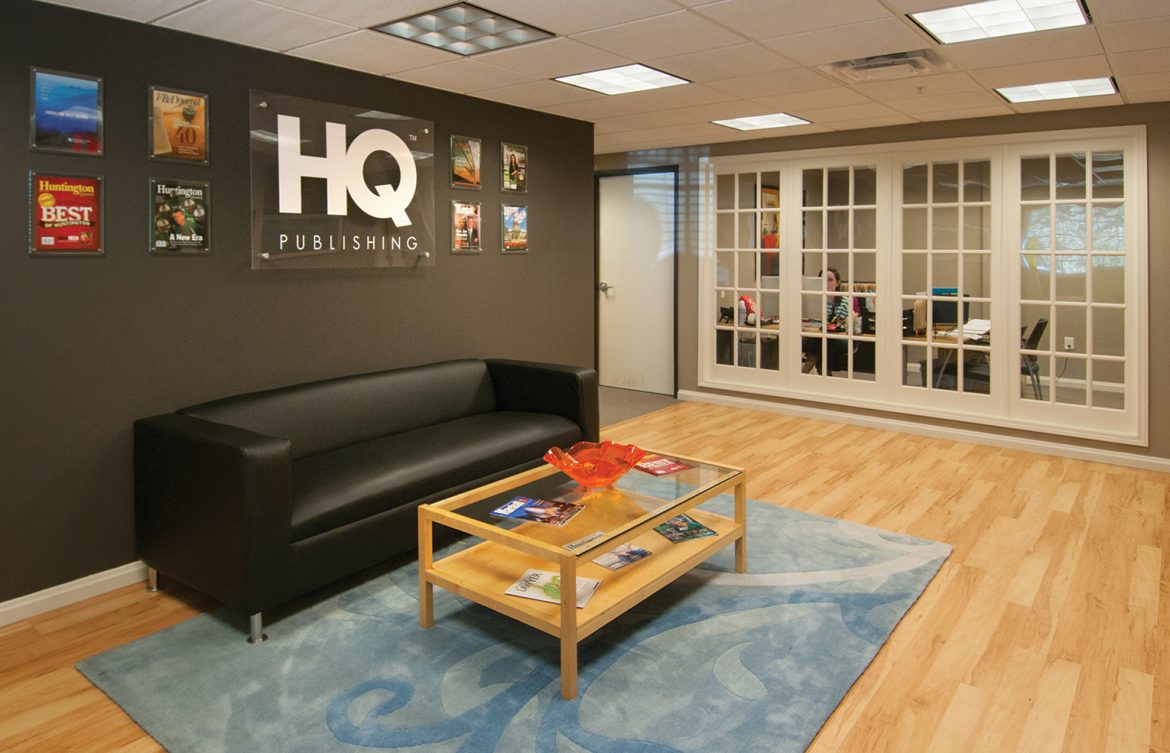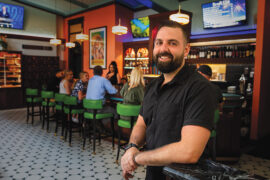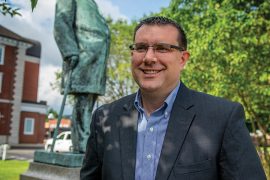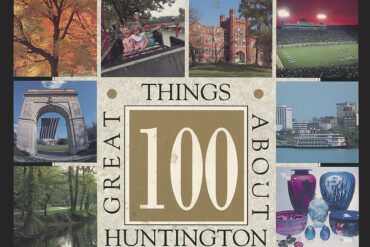The ups and downs, favorite stories, fondest memories and more from the last 30 years
a Q & A with Editor Jack Houvouras by James E. Casto
HQ 107 | AUTUMN 2019
The year was 1989. West Virginia’s governor was Arch Moore, Huntington’s mayor was Bobby Nelson and Marshall’s president was Dale Nitzschke. The Cosby Show was the No. 1 show on television, A Brief History of Time by Stephen Hawking was a best-selling book and Guns N’ Roses’ debut album was lighting up the music charts. Today’s Pullman Square was just a giant parking lot, Heritage Farm was merely a pasture and the Thundering Herd still played football at Fairfield Stadium. There were no mobile phones, there was no email and there was no internet.
In the fall of that year a new magazine called Huntington Quarterly debuted in town. The issue featured an autumn painting of Ritter Park by local artist Adele Thornton Lewis, a profile of civic leader A. Michael Perry, a look back to when John F. Kennedy campaigned in Huntington, a story on the fall and rise of Marshall football and more.
The magazine’s release was a dream come true for entrepreneur Jack Houvouras, who was 24 years old at the time. Houvouras was a 1988 graduate of Marshall’s School of Journalism, where he had been editor of The Parthenon, the university’s student newspaper. After graduating he had gone on to law school, but dropped out after just one semester. “Deep down I wanted to write and do something more creative,” he would later say.
The fledgling business started out in a 75-square-foot office on the third floor of the old Chamber of Commerce building on Ninth Street. There Houvouras and some of his good friends from the journalism school wrote articles, examined color slides and laid out the magazine on a Macintosh computer with a nine-inch monochrome monitor.
My, how times have changed! In the years since it premiered, the magazine has grown in size and reach aided by improved technology, a talented staff, gifted freelancers, loyal advertisers, devoted subscribers and new opportunities. In addition to the Huntington Quarterly, the magazine’s holding company, HQ Publishing Co., now publishes magazines for Marshall University, St. Mary’s Medical Center, Cabell Huntington Hospital, The West Virginia State Bar, the Virginia Bar Association and Marshall’s School of Medicine. The company that published just four editions in the 1990s now produces 18 magazine editions each year.
I recently sat down with founder Houvouras to reflect on the last 30 years. In that time, I have written more than 100 articles for the Huntington Quarterly and his other publications. I started our chat with the most obvious question of all…

Casto: What made you decide to start a magazine in Huntington?
Houvouras: There were several reasons, but the biggest was I needed a job. None of the local newspapers were hiring at the time and I didn’t want to leave the area. As my dad used to tell me, “Necessity is the mother of invention.” So, I came up with the idea of starting a magazine for Huntington. Another reason was there was so much negativity being written about Huntington at the time, even in our local newspaper. I thought the city needed a positive voice. And of course, I have always loved Huntington, so it was a perfect fit.
Casto: What kind of investment did you have to make to start the magazine?
Houvouras: My only investment was the purchase of a used Macintosh SE for $2,600. I didn’t seek a bank loan or borrow money from friends or family. I just needed a computer, a desk and a phone. And maybe some business cards.
Casto: What was it like preparing for the premier issue?
Houvouras: It was a lot of hard work. I probably logged 80 hours a week, but I loved every minute of it. Marshall Reynolds once told me, “Work is only work if you’d rather be doing something else.” He was right. I had to knock on a lot of doors to sell ads, but nine out of 10 businesses I called on took a chance on me and the magazine. I think that says a lot about the business community in Huntington. That show of support still surprises me today. But I also had a lot of help. My friends from the journalism program at Marshall volunteered their time and talent. Local photographer David Fattaleh generously offered his services for free for the premier issue. There were a lot of people who believed in the magazine.

Casto: Your father, Andy Houvouras, was a very successful businessman. What did he think when you told him about your plans to start a magazine in Huntington?
Houvouras: Well, I told him about my idea shortly after I dropped out of law school. He was really disappointed when I decided not to pursue a career in law. I think that was the only time I can recall that there was any real friction in our relationship. We didn’t speak for a month. When I eventually told him about the magazine he was skeptical. Later I formed a Board of Advisors that included the mayor, the Chamber president, the Marshall president and other civic leaders. I also asked my dad to join. At the first meeting of that group I made my pitch for why Huntington needed a magazine and how I planned to make it work. I was shocked when the first person to speak up in support of the idea was my dad. He told the group that he thought the idea was a winner and that he believed the business community would support it. After that meeting, he was 100% supportive of me and the magazine. That meant the world to me because my dad was my hero.
Casto: Did you encounter any naysayers when you launched the magazine?
Houvouras: Yes, a lot of people in town said the magazine wouldn’t last a year. But that just motivated me to work even harder. I wanted to prove all of them wrong.
Casto: Some people were concerned you would run out of story ideas after a few years. How have you continued to find good stories?
Houvouras: I get that question a lot, and the answer I give is: “It’s easy.” There are so many good stories in this community. You just have to open your eyes. That, and I get a lot of story ideas from our readers or people I run into at a local restaurant or walking down the street. I have a list of story ideas that is literally five pages long.

Casto: What have been some of the biggest challenges over the last 30 years?
Houvouras: One of them would be trying to balance my creative side with my business side. Those are two skill sets that don’t typically coexist. But I think I’m lucky because while I’ve always been creative, I somehow managed to inherit some of my dad’s business instincts. Another challenge has been advertising sales. We had a hard time convincing clients why it’s a good marketing investment and why magazine advertising works. They were all familiar with newspaper, television and radio advertising, but because Huntington had never had a magazine they were reluctant to try it. Even today they are still hesitant.
Casto: As a writer, what have been your favorite articles you’ve written?
Houvouras: The ones that stand out to me are profiles of Mike Perry, Chuck Yeager, Paul Newman, Bill Campbell, Brad Smith, Paul Ambrose and, of course, my father. That reminds me, I asked your advice on what headline to use for my dad’s article and you told me, “Andrew Houvouras: A Life Well Lived.” I used that, so thank you.
Casto: As a businessman, what are some of your biggest successes?
Houvouras: I would say the best decision was to expand into custom publishing — where we produce magazines for other entities. It’s interesting, but sometimes good writing can lead to good business opportunities. In the late 1990s I wrote a cover story in the Huntington Quarterly about Marshall alumnus John Drinko who was the managing partner of the 14th largest law firm in America. We became good friends. In 1999 Marshall University began publishing a magazine for its alumni. Drinko, who had donated millions of dollars to the university, was not impressed with the publication and called President Wade Gilley to suggest he outsource the magazine to my company. That was our first big contract. We’ve been publishing Marshall Magazine for 20 years now and I am extremely proud of how successful that relationship has been.
Casto: What about your biggest failures?
Houvouras: Obviously there are editorial decisions you make that fail. I’m too embarrassed to list them here. We all make mistakes and wish we could go back in time and change the way we handled certain situations. Maybe I was unprofessional with a client or came down too hard on a coworker. This can be a stressful business, and sometimes it can bring out the worst in you. But I try to learn from my failures and mistakes and avoid repeating them. That’s all anyone can do.

Casto: Have you faced any difficult ethical decisions over the years?
Houvouras: Yes. One year after starting the magazine someone offered me $10,000 to put their boss on the cover. That was a lot of money in 1990. But then I remembered the class in ethics that Bos Johnson taught and it was an easy decision for me. Heck, Bos thought it was unethical to let an article subject buy you a cup of coffee. I was offered a similar amount years later by someone and turned it down as well.
Casto: Thirty years is a long time. What are some of your fondest memories?
Houvouras: That’s tough. My chats with Mike Perry at Heritage Farm; interviewing Paul Newman; playing a round of golf in Florida with Bill Campbell; seeing Mark McVey perform on Broadway in Les Miserables; photographing Verna Gibson at her offices at The Limited in Columbus; hanging out with Chuck Yeager in Las Vegas; spending time with Brad Smith in Silicon Valley; getting an obligatory pie in the face from Soupy Sales; laughing it up with Clint McElroy, the funniest human being I know; selling 15,000 copies in less than two weeks of our We Are Marshall Commemorative Edition; and writing about and later getting involved with Little Victories Animal Rescue, a no-kill shelter in Ona, West Virginia.
Casto: What are you most proud of from the last 30 years?
Houvouras: I’m pleased that the business has persevered for 30 years, but what I take most pride in is the writing. I’m a businessman and a salesman, and I dabble in graphic design, but first and foremost I am a writer. I received two letters from men I wrote about that mean more to me than anything. The first was from Brig. Gen. Chuck Yeager, who wrote in part, “You really told it the way it was. There are many articles written about me, some good and some bad. Yours was one of the best I have ever read.” The other was from Bill Campbell, the amateur golfing great and one of Huntington’s finest gentlemen, that read, “I’ve never been so complimented as by your good opinion as expressed and revealed by your mighty efforts in my favor … I am as grateful as any man can be to another. Best of all, as I’ve always felt, is your talent and ability to write with both head and heart. I have lived a good life, and you are one of the reasons why. If anyone was to relate it, I am happy that it was you!”
Casto: Any regrets?
Houvouras: I wish my dad had lived a little longer. I was 38 when he died. And while those were 38 wonderful years, I wish I could have spent more time with him. I wish he could have seen the magazine grow and see how the business expanded. I know he would have been pleased with that. But I think he would have been equally pleased with my writing. As much as he wanted me to be a lawyer, he was the one early on who always told me I had a talent for writing. He encouraged me to write and offered to read anything I put to paper. He was the kindest, most positive and encouraging man I’ve ever known. I miss him often but his spirit is always with me.





